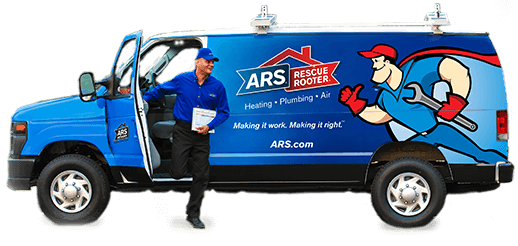Columbus Water Heater Repair

Need Hot Water Repair? Call Rescue Rooter Columbus
Looking for Columbus water heater repair service near you now? You might not think about how important your home’s water heater is until it stops working — or even worse when your water heater starts leaking!
Fortunately, Rescue Rooter Columbus can be at your home for plumbing services anywhere in the Columbus area at any time of day. Our expert hot water heater technicians can quickly identify the source of the problem and make the necessary repairs to ensure optimal efficiency and peak performance for your water heater.
From Hilliard to Upper Arlington, Westerville to Lancaster, and Dublin to Grove City, the only name you need to remember for water heater services is Rescue Rooter Columbus. Call today or book an appointment online to schedule service.
Water Heater Repair Services in Columbus, OH
Scheduling regular water heater maintenance with our team can prevent you from experiencing problems with your unit, but it is still helpful to know the signs that your water heater is in need of repairs.
No hot water
The most obvious indicator that your water heater is malfunctioning is a lack of hot water coming from the tap. You might also notice a more gradual decline in performance, as the water might take longer to heat up, or you may not have hot water for as long as usual when you are showering or doing the dishes. Not only is a lack of hot water a big nuisance, but it could also result in higher gas or electric bills since your unit is likely using more energy to work with a diminished performance.
Rust in the water heater tank
Rust can be a big problem for water heaters, posing a risk for corrosion and contamination of your water. When rust is present, the anode rod likely needs replacing. This is a relatively simple fix for our technicians that could spare you from more serious problems later on.
Water leaking from the unit
Left unaddressed, rust can corrode the water heater tank liner, causing water to leak from the unit. This might cause damage to your floors, walls, or ceilings, depending on where the unit is located in your home.
When to Repair or Replace
In some cases, our plumbing company will recommend that you replace your water heater rather than invest in repairs. This is generally the case when the water heater is more than 10 years old or the cost of repairs would total more than half the cost of a whole new unit.
In the past, water heater replacement was a simple process: when a water heater finally failed, it was replaced with an identical model. Today, new water heater installation is an opportunity to evaluate your home’s current and future hot water needs so you can choose a system that will deliver not only the hot water you need but the energy efficiency you desire. Furthermore, new standards put into effect by the United States Department of Energy on April 16, 2015, require water heating systems to be even more efficient, allowing Columbus homeowners to enjoy the hot water at lower financial and environmental cost than ever before.
Factors to consider:
Selecting a water heater with the right capacity and recovery time to meet your family’s expected hot water demands will result in the function you want and the savings you expect. When purchasing a new water heater, you should think about:
- The amount of hot water you use each day and whether your existing water heater is able to meet that demand. This amount is typically based on the number of people in your home.
- Whether one water heater is enough for your home, or if you might benefit from two or more appliances to better meet your needs.
- The type of fuel you prefer your water heater to use, as well as its predicted cost and availability in the future. Modern water heaters can use gas, oil, electricity, and solar energy as potential fuel sources.
- The energy efficiency of the models you are considering and how much they can save you on long-term costs, based on your estimated usage and their lifetime.
- The manufacturer’s warranty available with any new system, including its length and the type of failures it covers.
- The predicted maintenance schedule and costs of the system, as well as the common repair needs and costs associated with wear and tear over time.
- The comparison between the initial cost of the unit and the expected operating cost of the system over its expected lifespan.
Types of water heaters:
The type of water heater you install will affect its operating cost, efficiency, maintenance needs, and expected lifetime.
Gas water heaters
Gas-fueled water heaters are the most common appliances in use in the United States. A gas water heater may be fueled by natural gas, propane, or oil. Gas storage tank water heaters contain a tank ranging from 20-80 gallons, which is fed from the bottom by a cold water intake. The water is heated inside the tank, then exits the top via a pipe leading into your home when you open the tap.
Electric water heaters
Electric water heaters also heat water inside a storage tank for distribution throughout your home. In this case, two electric heating elements controlled by individual thermostats are responsible for heating the water inside the tank.
Tankless water heaters
Tankless water heaters are often called on-demand water heaters. These water heating systems create hot water as it is needed by heating the water that flows from your water main to your tap, bypassing the need for a tank.
A tankless water heater often costs less to operate over its lifetime, but typically costs more upfront than storage tank water heaters. Depending on your needs, you may need more than one tankless water heater to meet your daily hot water demands.
Tanked vs. Tankless Water Heaters in Columbus
Storage tank water heaters are typically the least expensive systems. However, all storage water heaters lose some amount of heat over time because they must constantly keep water in the tank hot. Despite this standby heat loss, storage water heaters have come a long way in terms of efficiency; opting for the most efficient system you can afford will help you recoup greater energy savings over time.
Tankless water heaters cost more to purchase and install than storage systems but save money on both energy and water by eliminating standby heat loss and heating water faster so less cold water is wasted while you wait.
When considering the cost of a new water heater, it’s also important to consider the cost of installation, including strapping, water line connection, and gas line installation or connection. Never trust a “blind quote” given over the phone, as it cannot take into account all the factors associated with water heater replacement.
Talk to your plumber at Rescue Rooter Columbus for a free in-person evaluation and personalized quote for new water heater installation or heater repair in Columbus, OH.
Special Offers
Reviews for
Rescue Rooter Columbus




Step 2 of 2